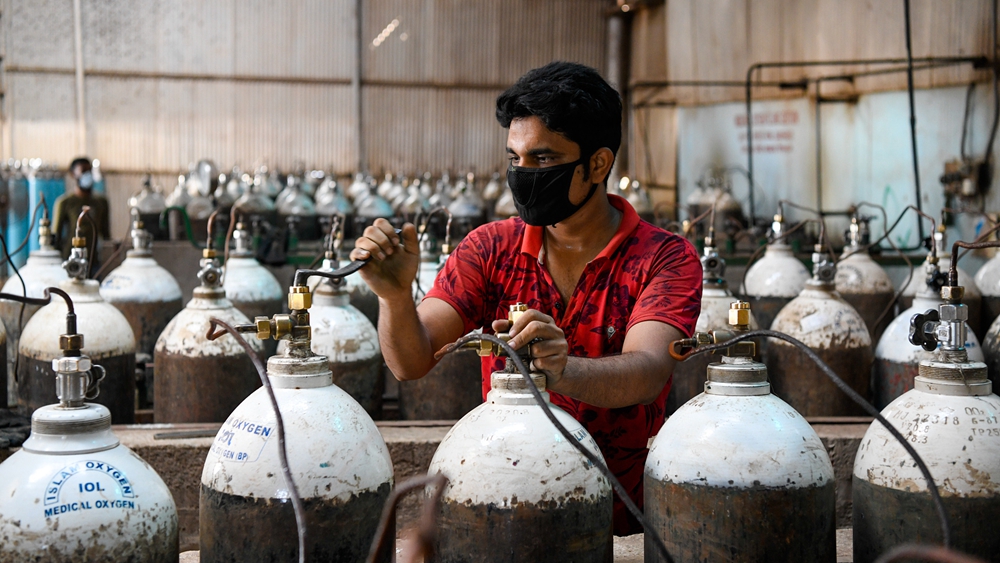
Refilling oxygen cylinders inside an oxygen factory amid a countrywide lockdown due to the COVID-19 in Dhaka, Indonesia, July 8, 2021. /CFP
Refilling oxygen cylinders inside an oxygen factory amid a countrywide lockdown due to the COVID-19 in Dhaka, Indonesia, July 8, 2021. /CFP
The global fight against the coronavirus pandemic has met a setback in recent months due to the highly contagious Delta variant, which has caused rising cases and new rounds of lockdowns in many countries.
The Delta variant, also known as B.1.617.2 , was first detected last year in India and is now spreading in multiple countries, upending plans for a return to normalcy.
The World Health Organization (WHO) said last week that the variant is present in nearly 100 countries and warned that in the coming months the highly transmissible strain will become the dominant variant of COVID-19 globally.
"Ninety-six countries have reported cases of the Delta variant, though this is likely an underestimate as sequencing capacities needed to identify variants are limited," the WHO said in its recent COVID-19 Weekly Epidemiological Update.
"Given the increase in transmissibility, the Delta variant is expected to rapidly outcompete other variants and become the dominant variant over the coming months," the global health agency added.
Read more:
What to know about the Delta COVID-19 variant first detected in India

Empty tables and chairs are seen at a closed restaurant along a quiet Sydney Opera House forecourt in Sydney, July 6, 2021. /CFP
Empty tables and chairs are seen at a closed restaurant along a quiet Sydney Opera House forecourt in Sydney, July 6, 2021. /CFP
In Australia, the highly contagious variant prompted Sydney to extend lockdown to third week and New South Wales reported its biggest daily rise in locally acquired cases of COVID-19 for the year on Friday.
Other countries, including South Africa, Bangladesh, Indonesia and Thailand, have implemented new travel bans or tighter lockdown restrictions in a bid to curb the virus spread.
Many media outlets have reported that the variant is present in all 50 states in the U.S. and is already dominant in many parts of the country.
On Tuesday, U.S. President Joe Biden encouraged Americans who have not yet been vaccinated against COVID-19 to get their shots to protect themselves from the variant.
Although a recent Israeli study found that the protection provided by the Pfizer vaccine is less effective at halting the spread of the Delta variant, it also indicates the vaccine is 93 percent effective against serious illness and hospitalization.

The waiting area of a pop-up vaccination site at St. John The Divine Cathedral sits empty as the rush for vaccinations winds down in New York City, June 27, 2021. /CFP
The waiting area of a pop-up vaccination site at St. John The Divine Cathedral sits empty as the rush for vaccinations winds down in New York City, June 27, 2021. /CFP
During an interview with National Public Radio (NPR) on Thursday, Dr. Anthony Fauci, director of the National Institute of Allergy and Infectious Disease in the U.S., said studies continue to show that vaccines are not only effective against the virus, but also highly effective at preventing serious disease or hospitalization.
That's just part of the reason why it's so crucially important to get vaccinated, Fauci was quoted by NPR as saying.
But the global vaccination efforts have suffered setbacks.
On the one hand, the disaster has exposed the gap between the haves and the have-nots, with vaccination drives barely getting started in Africa and other poorer corners of the world because of an extreme shortage of shots.
On the other hand, in the countries that have ordered many vaccines, fewer people are getting jabs.
A recent poll showed that 30 percent of adults in the U.S. have not received a vaccine against COVID-19 and have no plan to do so, U.S. television network ABC reported.
The contagious variant and uneven access to vaccines prompted Ann Lindstrand, a top immunization official at the WHO to call on countries to get serious about the worldwide crisis instead of treating it as a "me-and-myself-and-my-country" problem.
"This is a worldwide problem that needs worldwide solutions," the AP quoted Lindstrand as saying.
Estimates from Peace Research Institute Oslo showed that the tally of lives lost over the past year and a half, as compiled from official sources by Johns Hopkins University, is about equal to the number of people killed in battle in all of the world's wars since 1982.
(With input from agencies)

